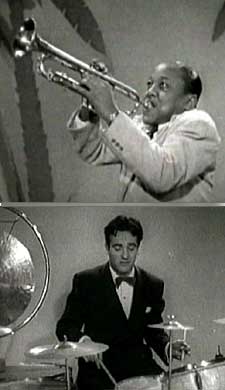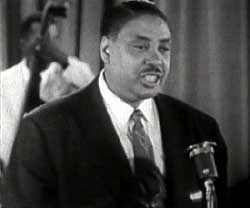 Big Joe Turner stars in the Studio telescription Oke-She-Moka-She-Pop (1954), backed up by the Paul Williams band. This performance is distinct from the hit version recorded a year earlier in Chicago. This performance was incorporated into the stitched-together half-hour program posing as a live concert, Showtime at the Apollo: Variety Time (1955).
Big Joe Turner stars in the Studio telescription Oke-She-Moka-She-Pop (1954), backed up by the Paul Williams band. This performance is distinct from the hit version recorded a year earlier in Chicago. This performance was incorporated into the stitched-together half-hour program posing as a live concert, Showtime at the Apollo: Variety Time (1955).
Several of these half-hour television specials & two couple feature-length releases were presented as "concerts" at the Apollo, using telescriptions dating to as early as 1950. But Joe Turner did his two pieces in 1954 so the faux concerts would be entirely recycled footage.
Joe's other piece was Shake, Rattle and Roll (1954) included in Live at the Apollo: Stars Over Harlem (1955). The majority of the material in the two episodes Variety Time & Stars Over Harlem were also part of the feature-length Rhythm & Blues Review (1955), but Oke-She-Moka-She-Pop is not duplicated in the theatrical release.
Any act seen in the various 1955 "Apollo" compilations for which the Paul Williams band can be seen in the background were recorded in Manhattan in 1954, along with new chit-cat material & comedy routines. And while the acts (whether filmed in 1950 or 1954) were authentical live recordings, not a one of them was done at the Apollo.
Oke-She-Moka-She-Pop is a bluesy rock & roll number. Joe is one of the truly signal performers for the birth of rock 'n' roll. His greatness is unquestionable as he sings: "It's been a long time since I carried your books to school/ Been a long time since I carried your books to school/ Well we had a whole lot of fun riding on my grampa's mule
If his stylization meant an awful lot of jump-jazz performers were about to lose their sales to a new sound, can't really blame him for daring to be new. But we can blame America for waiting until comparatively crappy rock bands like Bill Halley & the Comets covered Joe's music before the songs could gain airplay.
Paul Williams' saxophonist gets a rocking solo at the instrumental break, & what a shame the saxophone would all but vanish as a rock-band standard by the time of the British invasion (Dave Clark Five notwithstanding). The sax is a true part of the soul of rock & roll, the instrument that unites '40s jump-blues by the likes of a Louis Jordan with '50s rock.
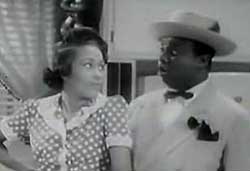 In the comedy soundie Low Down Dog (1944), comedian Dudley Dickerson lip-syncs a jump-blues number actually sung by Big Joe Turner.
In the comedy soundie Low Down Dog (1944), comedian Dudley Dickerson lip-syncs a jump-blues number actually sung by Big Joe Turner.
Dudley in a white suit comes home unexpectedly & discovers his wife with the milkman. He chases the man off then sings to his faithless wife:
"I ain't gonna be a low down dog no more/ I ain't gonna be a low down dog no more/ If you don't want me baby it's on down the road I go/
"Well I work all day, I brought you home my pay/ Worked all day, brought you home my pay/ Well you certainly gonna miss me when I'm gone away.
"Oo-oo, oo-oo-wee/ Oo-oo, oo-oo-wee/ It's a low down shame the way you been treating me."
His wife with an annoyed look goes from the kitchen into the living room, where we see the piano player who has been accompanying Big Joe's vocals is none other than Meade Lux Lewis! So while the "singer" isn't really Big Joe Turner on screen, the pianist really is Lux.
So, that faithless woman had her milkman in the kitchen while she also had her piano man in the living room.
She sits down beside Lux smiling through his piano solo, then loses the smile when Joe picks up the lyrics anew. She gets on the phone & calls a third boyfriend, who soon shows up to take her away.
Though it's interesting to see a soundie structured as a fiction movie, as a musical performance it's a disappointment that it doesn't really have Big Joe Turner in it, so only Meade Lux Lewis is a real musician here, one of the coolest jazz pianists that lived.
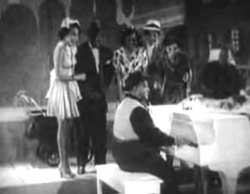 The instrumental soundie Boogie Woogie (1944) starts with jazz pianist Meade Lux Lewis & commedian Dudley Dickerson as furniture movers loading their moving truck. Lux sits down at the white grand piano & begins pounding out a brilliant boogie woogie piece.
The instrumental soundie Boogie Woogie (1944) starts with jazz pianist Meade Lux Lewis & commedian Dudley Dickerson as furniture movers loading their moving truck. Lux sits down at the white grand piano & begins pounding out a brilliant boogie woogie piece.
Though ostensibly happing on the sidewalk, it's a very theatrical setting giving only an impression of being the street.
One by one young men & women begin wandering by, in pretense of the stage being a sidewalk. One woman is pushing a baby buggy. None of them can get past Lux, but have to stop & listen to his winning performance.
The camera pans in & we are momentarily permitted to see Lux smile our way (none of the extreme mugging Fats Waller was known for), & we see his hands on the piano, though like nearly all soundies this is bound to have been pre-recorded ahead of filming.
You can't listen to a performance like this & not dance, & the six people who stopped to listen take off on some boogie steps.
They're very good of course, but curiously, they never get really boogying hard. Someone must've decided not to distract from Lux's performance. tHe dancers gather around the piano & lean in for a group portrait as Lux plays us on home.
We don't see much of Dudley in this one, but he appears in a handful of 1942 soundies around this period, including with Lux not only in Boogie Woogie but also in two soundies wherein Dudley lip-syncs Big Joe Turner, Low Down Dog & Roll 'Em.
Dickerson was a successful character actor from the 1930s through 1950s, though Hollywood being what it was, he mostly played cooks, doormen, orderlies, janitors, pullman porters, & not even credited in the cast lists.
He appears in Three Stooges films in which he's supposed to be even dumber & more scared of stuff than the Stooges, which is pretty lame. And he was the shoeshine "boy" Joe in the television version of Amos & Andy.
On the chitlun circuit, though, he was a big draw as a specialty dancer & comic, & the soundies were lucky to get him. He adds a moment of humor in the Dorothy Dandridge soundie Cow Cow Boogie (1942), & the Louis Jordan soundie On the Outskirts of Town (1942).
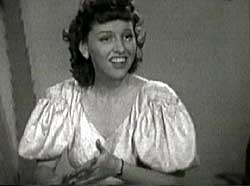 Gene Krupa looking like such a hep beatnik sits at his drum kit above his orchestra on Let Me Off Uptown (1942), the Krupa band's biggest hit, with lyrics about the rib joints & juke joints of Harlem.
Gene Krupa looking like such a hep beatnik sits at his drum kit above his orchestra on Let Me Off Uptown (1942), the Krupa band's biggest hit, with lyrics about the rib joints & juke joints of Harlem.
The piano featuring Milt Raskin is center stage front, & behind the pianist is vocalist Anita Day, quiet for the longest while as the instrumental progresses.
The singer finally comes forth along with trumpeter Roy Eldridge. She says, "What you know Joe?" He says he's not Joe. "My name's Roy." She says, "Well come here Roy & get groovie." They chat-rap for a while, until she begins to sing:
"Pleasure you're about/ And you feel like stepping out/ All you gotta shout is 'Let me off uptown..." It's a nice jump-jazz piece, & soon there's a cut to two dancers doing an altered cakewalk that turns into jitterbug.
Back to Anita, rejoined by Roy, he sings part of a verse just before he gets his big trumpet solo, while the band goes crazy yelling & stomping & Anita's dancing.
Everything is done to make Ray seem like the star of this soundie, & even Gene is secondary, but Anita just naturally dominates without having to have the whole band stand up & shout in her behalf. And her ability to upstage Roy without intending to do so caused him (according to her autobiography) to treat Anita a little bitterly on the road.
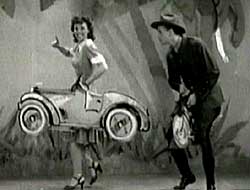 The same set, filmed on the same day as the soundie Let Me Off Uptown, Gene Krupa & Orchestra are still way up-tempo for Thanks for the Boogie Ride (1942).
The same set, filmed on the same day as the soundie Let Me Off Uptown, Gene Krupa & Orchestra are still way up-tempo for Thanks for the Boogie Ride (1942).
"Thanks for the boogie ride/ I'm more than gratified/ I'm really satisfied, which only goes to prove/ You don't know until you've tried/ Into the boogie ride/ How quickly you will glide out of this world."
Anita starts out dignified enough singing in front of the band, but then there's a cut-away to her & some unnamed fellow dancing with props, she in cardboard car, he on a cardboard motorcycle & police uniform. The guy pulls her over, for speeding evidently. They ditch the props & do the boogie woogie together.
Roy Eldridge comes center stage with Anita & she watches his horn solo. He strikes such a classic jazz pose, like Gabriel calling the final battle. Gene closes with a funny-face & wack on the tin hat.
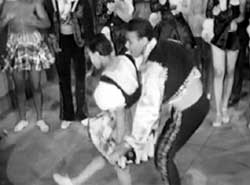 One of the greatest of all the Minoco soundies was Sugar Hill Masquerade (1942), the title alluding to the wealthy district of Harlem where doctors, lawyers, undertakers, millionaires, & successful entertainers lived. It's not the likeliest locaton for a street party & in fact the film itself makes no allusion to Sugar Hill per se. One of the greatest of all the Minoco soundies was Sugar Hill Masquerade (1942), the title alluding to the wealthy district of Harlem where doctors, lawyers, undertakers, millionaires, & successful entertainers lived. It's not the likeliest locaton for a street party & in fact the film itself makes no allusion to Sugar Hill per se.
The film opens with a sign that reads "Block Party Masquerade: Big Prizes," followed by a second sign on the same brick way, "Block Party Featuring Hot Lips Fuller, Trumpeteer, & Rubber-Arms Marshall, Drummer."
"Trumpeteer" Walter Fuller lived until 2003, the last surviving member of the Earl Hines Orchestra. He was born in Tennessee, grew up in Chicago, where he was hugely influenced by Louis Armstrong. It's Fuller scatting on the 1933 Earl Hines hit "Rosetta" after which Fuller's nickname was Rosetta rather than Hot Lips as the soundie suggests, & he would later name his daughter Rosetta. In the 1940s he made San Diego his home & became an activist for Civil Rights.
When the Earl Hines Orchestra disbanded in 1940, Fuller started his own band, so it seems fairly obvious the quartet in the band-box were guys chosen from Fuller's orchestra. The bass drumhead is obscured by the bandstand, but has what looks like an Anarchy symbol on a golf-T, which would indicate the band had "A" &am "O" & "T" in the name, though I can't for the life of me make hide nor hair of that possibility.
Strangely there are several citations, likely copied from one another, asserting that this quartet was drawn from the Gene Krupa Orchestra & that Roy Eldridge is present. There's no reason on earth a great trumpeter like Walter Fuller would be pretending to play to a recording of the also-great Roy Eldridge; so I have to assume the identification with Krupa's integrated band is just a longstanding error.
The soundie begins with the guys in the bandbox playing nurdy stuff & the dancers in the street chanting "No, No, No!" until at long last Walter Fuller bursts into a wild, rapid jazz rendition of "After I'm Gone," setting the dance competition in motion.
Herbert "Whitey" White's Lindy Hoppers are the real stars of this soundie. They were from the Savoy in Harlem, where dance contests were held nightly by regular patrons, & the best of the best of the best were selected by Whitey to become club performers, with sub-groups "leased" out to other clubs & even getting movie gigs.
They appear in a handful of soundies including Air Mail Special (1941) with Count Basie, & Hot Chocolate (1941) with Duke Ellington, & the dance-soundie Outline of Jitterbug History (1942). There has never been a finer dance troupe.
Two top dancers from among the gathering begin jitterbugging better'n you've ever seen, unless you've seen Whitey's Lindy Hoppers before. A group of four gals compete next, & they're good but they're definitely not Whitey's dancers; it's my guess they're Apollo girls, or from the regular Savoy chorus line. But soon another couple from the the Lindy Hoppers burst to the foreground, & it's once more tremendous stuff.
Next out are a little tiny guy & super tall mustached dude in a print dress for a comedy jitterbug. As dancers trade-off as street contestants, they're also displaying their wacky costumes, since it's a masquerade dance. Wonderful, wonderful soundie!
copyright © by Paghat the Ratgirl
|
